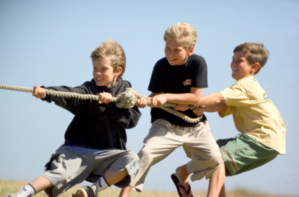Category — 3.5 Eight to Ten 6-12: Social/Emotional Skills
Social/Emotional Skills
Social/Emotional Skills
(see full Glossary)
When a child is between 8 and 10 years old, friends (Fig. 1) become more and more important, and being part of a social group becomes a major goal in life. What they wear and what music they listen to become sources of pride or shame. It is important to keep in mind that these are stages that most children go through, some for a longer period than others. Eventually, most children come out of it.
Social Skills
Children at this age:
- are highly social and usually have many friends;
- are usually part of at least one social group;
- enjoy playing complex social games (Fig. 2) that require keeping score;
- may still prefer to be with friends of the same gender;
- enjoy engaging in group work with their peers;
- enjoy sharing their point of view with others;
- understand a person’s right to privacy, but may spread a secret nonetheless;
- may be a bit impatient when explaining something they know to someone who doesn’t know it;
- may be a bit competitive, mainly because they have mastered a lot of skills (mainly academic) that parents value and they want to show them off;
- usually able to resolve minor conflicts on their own;
- understand and respect personal space (this is highly dependent on one’s culture).
Figure 1. Friends
Figure 2. Social games
Emotional Skills
Children at this age:
- tend to be more resilient (see full Glossary) than they used to be;
- may be highly critical of themselves;
- have good impulse control (see full Glossary);
- can identify and label their feelings;
- can identify and label how others are feeling;
- have a positive, but still quite fragile, self-esteem (see full Glossary).
Did you know?
- Although children at this age have a better developed sense of self and are able to accept criticism, it is highly recommended that criticism would be given very constructively and very rarely. When a child this age makes a mistake it is best to redirect, rather than criticize because they still rely, quite heavily, on how others view them.
- Despite the fact that they are now more resilient, they may give up on certain tasks very quickly. This may come from the belief that “if I can’t do it fast, I can’t do it at all”.
- Morality is developing quite strongly and children of this age will often talk about “fairness” issues. Of course, often, what they consider “not fair” is anything they do not like.
- Your children may accept suggestions from all adults around them, except you. This is perfectly typical at this age. They know that they still need help from adults, but want to show you how independent they are. As difficult as this may be, you must not take this personally.
see References
November 26, 2011 No Comments

